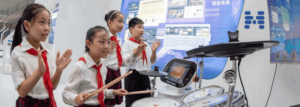
KUALA LUMPUR, 20.8.2021. Higher education institutions are facing pressure to keep up with the new demands of the workforce that are presently challenged by technological disruption, the evolving nature of jobs, and a radical shift to virtual learning.
Technology is quickly revolutionizing the traditional work environment, and colleges may not be changing quickly enough to meet the new demands. In a study posted by Dell Technologies, it stated that 85% of emerging jobs in 2030 do not exist yet, making it impossible for higher education institutions to prepare for them.
This creates a “skills gap” – a divide between graduate skills and employer expectations when it comes to in-demand soft skills at work.
According to the QS Global Skills Report 2019, some of the widest skills gaps faced by employers in modern graduates are problem-solving, resilience, and communication competency.
 Clear communication skills play a large role in meeting expectations at work.
Clear communication skills play a large role in meeting expectations at work.
“Understanding the global skills gap involves identifying the trends that continually repeat themselves in different contexts worldwide,” the QS report stated. “Many employers identify the same valuable skills and skills shortages in graduates across industries and countries.”
The QS report also noted that graduates may be overlooking soft skill development, such as flexibility, negotiation, and resilience. This is a large contrast to employers who place a much higher priority on these skillsets, ranking them 4th and 5th in terms of value in the workplace.
Students are also likely to overestimate creativity, leadership and language skills, whilst employers rank them 13th and 14th respectively, placing them much lower than student expectations.
While there is a clear mismatch between the skills graduates consider important and employer expectations, it can be resolved by educating both institutions and students about the skills they should be cultivating to prepare for the workforce.
A change of mindset is also required from both sides. Students will need to equip themselves with the internal motivation to self-learn, while instructors and trainers should prepare themselves for the possibility of providing remote training. The focus should not only be on digesting information and presenting facts, but to emphasize the humane side of emotional support and empathy.
At the same time, subjects on arts and humanities are gaining recognition among employers for their strategic thinking and creative problem-solving skills that are essential in middle management roles.
This strengthens the importance of soft skills in academic programs and courses to drive up employment rates and secure a fulfilling career.
Hence, universities serious about helping their students bridge the skills gap should re-evaluate their current curriculum and take stock on the skills needed to prepare their graduates for the future of the workforce.

Tee May
Teemay is a content writer who relishes telling a good story as much as she enjoys reading one. A fan of fantasy and time travel lore, she indulges herself with quaint daydreams of living in a vintage cottage settled deep in the woods. She hopes to achieve this one day, or may just settle with a treehouse instead. In her free time, she practices amateur astrology and interprets birth charts. These started out as a hobby for ‘fun’, but they come close to being obsessions these days.





